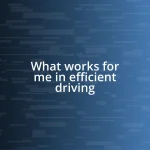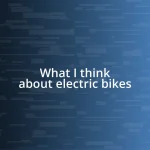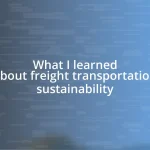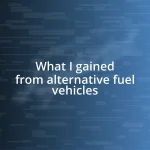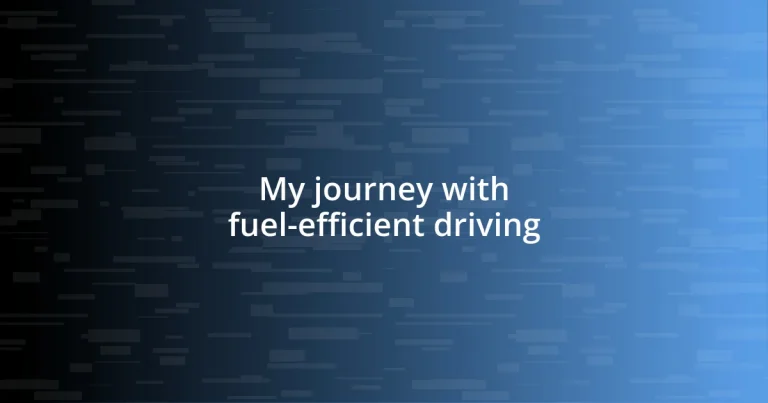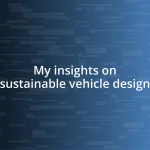Key takeaways:
- Fuel-efficient driving involves small changes like smooth acceleration, maintaining steady speeds, and proper vehicle maintenance, which greatly enhance fuel economy and overall driving enjoyment.
- The benefits of fuel-efficient driving extend beyond cost savings to include reduced carbon emissions, enhanced vehicle longevity, and a deeper connection to the driving experience.
- Tracking fuel efficiency through apps and monitoring habits fosters accountability and reveals patterns that lead to significant long-term savings and improved vehicle health.
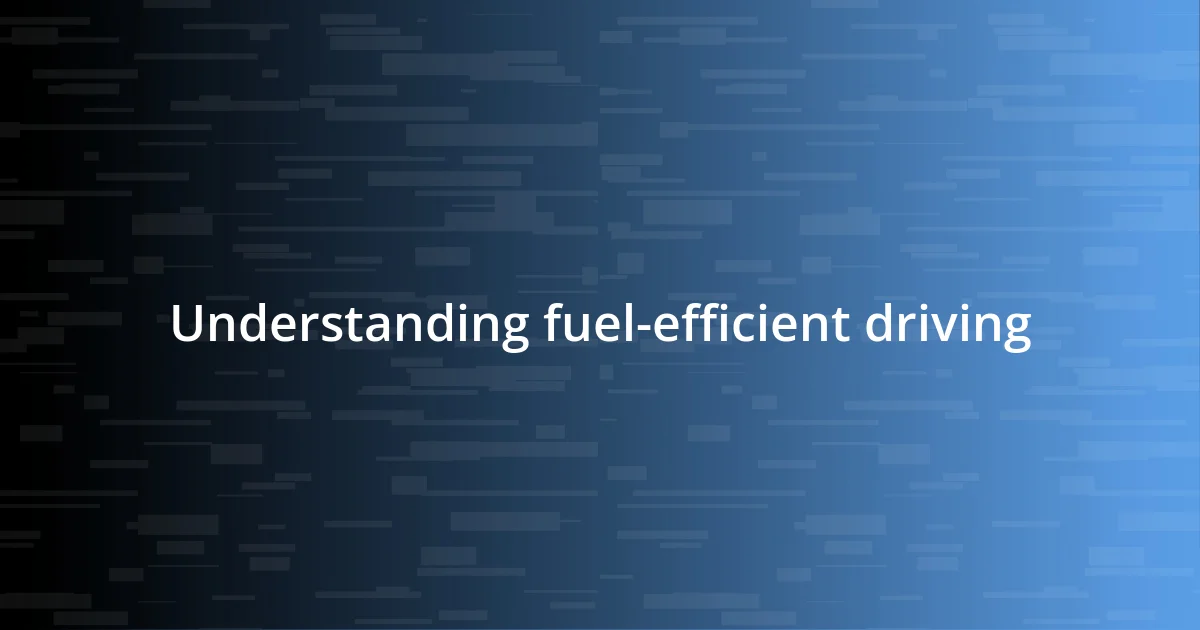
Understanding fuel-efficient driving
Fuel-efficient driving is not just about saving money; it’s an approach that can transform your entire experience on the road. I remember the first time I consciously shifted my driving habits—accelerating gently rather than gunning it made me feel more in control, as if I was guiding my vehicle with intention. What’s intriguing is how small changes, like maintaining a steady speed, can enhance not only fuel efficiency but also your overall driving pleasure.
When I started paying attention to my driving habits, I was surprised to discover that factors like tire pressure and vehicle weight play significant roles. For instance, I once drove with a packed trunk and noticed my gas mileage plummet. Have you ever considered how much the ‘stuff’ in your car affects how much you spend at the pump? It’s eye-opening to think that decluttering could actually lead to better fuel economy.
Understanding the mechanics behind fuel-efficient driving can feel overwhelming, but it’s really about making thoughtful choices. I’ve found that using cruise control on highways often leads to smoother rides and less fuel consumption. Who wouldn’t want a calmer drive while also saving gas? It’s like discovering a win-win lifestyle change that just makes sense.
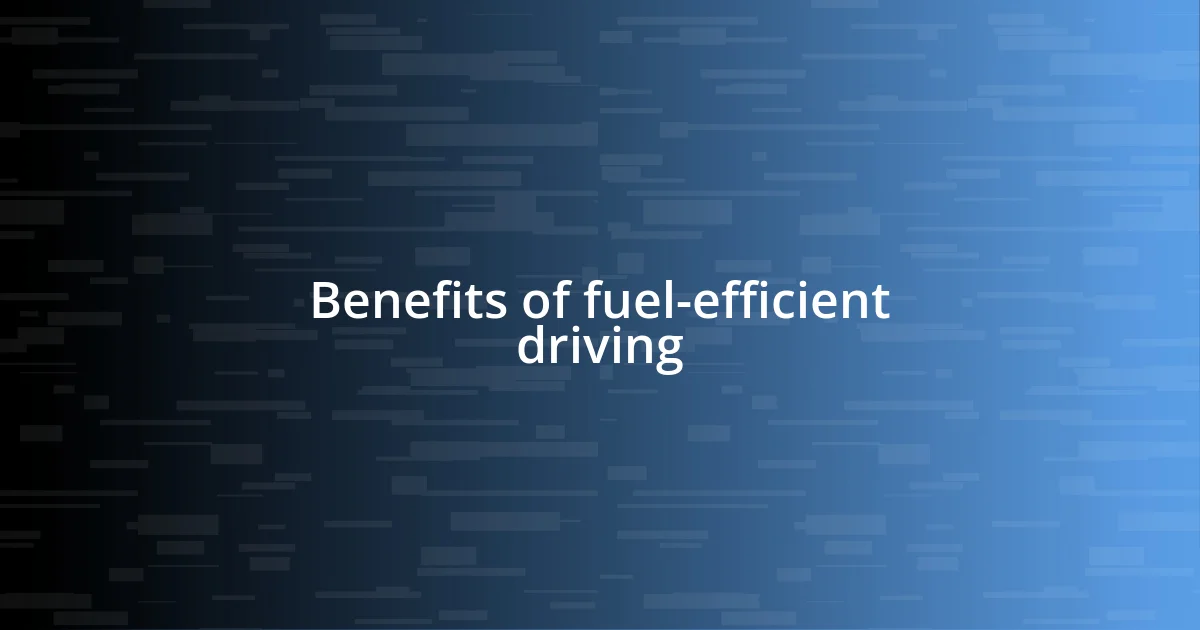
Benefits of fuel-efficient driving
Fuel-efficient driving offers a multitude of benefits that extend beyond mere cost savings. Each mile driven efficiently is like gifting yourself a little extra cash in your pocket. I remember the satisfaction I felt when I first calculated my savings after a week of mindful driving—my wallet seemed to smile back at me. Beyond finances, it fosters a deeper connection with the journey. You notice the beauty around you more, as you’re less distracted by the urge to speed.
Moreover, engaging in fuel-efficient practices contributes to a healthier environment. It’s a comforting thought, knowing that every time I ease off the accelerator, I’m reducing my carbon footprint. I still vividly recall the day I visited a local park and saw an area that was once neglected. The clean air felt refreshing, and it struck me how my small driving changes could play a part in keeping our planet beautiful. Isn’t it empowering to think we can make a difference in such an accessible way?
Finally, fuel-efficient driving enhances vehicle longevity. Just as I learned to treat my car with respect to optimize its performance, I’ve noticed that smooth acceleration and gentle braking reduce wear and tear. It’s rewarding to realize this practice not only saves fuel but could also mean fewer trips to the mechanic. By nurturing my vehicle through mindful habits, I’m investing in both its future and my own peace of mind.
| Benefit | Description |
|---|---|
| Cost Savings | By investing in fuel-efficient driving, you can significantly reduce your fuel expenses. |
| Environmental Impact | Driving efficiently lowers carbon emissions, contributing to a healthier planet. |
| Vehicle Longevity | Mindful driving habits can extend the life of your vehicle, leading to fewer maintenance costs. |
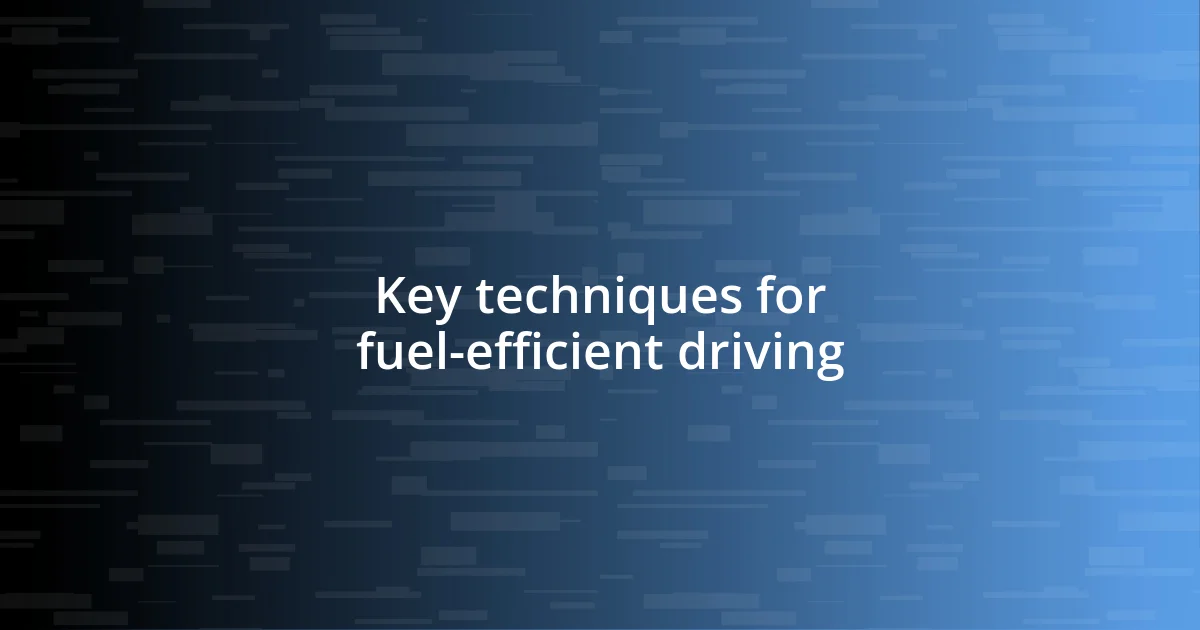
Key techniques for fuel-efficient driving
When diving into fuel-efficient driving, I’ve found that picking up a few key techniques makes a world of difference. One day, while stuck in traffic, I realized that aggressive driving—like sudden accelerations and hard braking—had me using up more fuel than necessary. So I decided to take a calmer approach. It’s amazing how effortless driving can transform your experience behind the wheel while making fuel savings easier to achieve.
Here are some key techniques that have worked wonders for me:
- Smooth Acceleration and Braking: Easing into speed and stopping gradually can significantly boost fuel efficiency.
- Maintain Steady Speeds: Using cruise control on the highway often improved my mileage, making long trips less taxing and more enjoyable.
- Regular Vehicle Maintenance: Keeping my engine tuned and the air filter clean resulted in noticeable performance improvements that reflected in my fuel economy.
- Proper Tire Pressure: I still remember the day I inflated my tires to the recommended levels; my gas mileage improved almost instantly.
- Reduce Extra Weight: After removing unnecessary items from my trunk, I couldn’t believe how much my car appreciated the reduced load, resulting in better performance.
These small shifts have made me more mindful on the road, and I genuinely enjoy each drive more now. Over time, I’ve come to cherish this change not just for the savings, but for the sense of control and peace it offers. Every little adjustment feels like an investment in my driving experience.

Common mistakes to avoid
Many drivers unknowingly fall into the trap of excessive idling. I used to think that leaving my engine running while waiting was harmless, but I soon learned that it’s just wasting fuel. Imagine the surprise on my face when I discovered that turning off the engine even for a brief time could save me money and reduce emissions. I still find it hard to believe how easy it is to make that change.
Another common mistake is ignoring tire maintenance. I remember driving on under-inflated tires for weeks, thinking it wouldn’t make a significant difference. But once I checked the pressure and filled them to the recommended levels, I felt an almost immediate improvement in my fuel efficiency. Have you ever noticed how a slight adjustment can make a world of difference? It’s a small task that packs a powerful punch.
Lastly, many of us overlook the importance of planning trips efficiently. I’ve been guilty of making last-minute detours, thinking they wouldn’t impact my fuel consumption. However, I quickly realized that mapping out my routes not only saved me time but also reduced unnecessary fuel expenditure. It’s all about being mindful of how I navigate my day. Have you considered how your route choices affect not just your fuel costs, but also your overall driving experience?
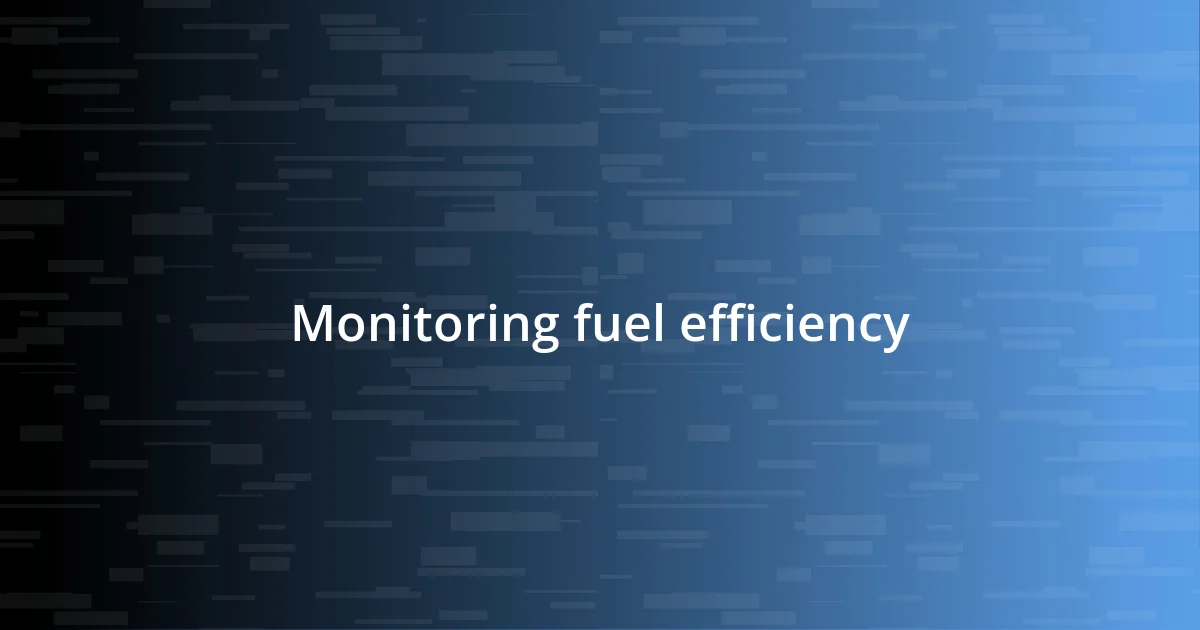
Monitoring fuel efficiency
Monitoring fuel efficiency has become a key part of my driving philosophy. I remember the first time I actually started tracking my mileage using an app. The way it provided insights into my driving habits was nothing short of eye-opening. Have you ever felt that surge of empowerment when you see exactly how your behaviors influence your fuel consumption? It’s that immediate feedback that has kept me motivated to improve.
One practical tip I’ve embraced is paying attention to my fuel economy display—especially during different driving conditions. For example, I once noticed a stark drop in my efficiency while driving in heavy traffic compared to when I was cruising on the highway. I couldn’t believe how much those stop-and-go moments impacted my overall usage. Have you monitored your engine’s performance similarly? The data it presents can serve as a fantastic motivator for making mindful adjustments on the road.
I also find it helpful to keep a log of my fuel purchases and mileage. I still recall the day I reviewed my tracked data and realized that my consistent smooth driving habits were translating into savings on fuel costs. It felt rewarding to see the numbers corroborate my efforts. What if you took that extra step of measuring your efficiency? You might be surprised by the tangible impact of your choices. The numbers tell a story, and it’s one that reflects our habits, encouraging us to drive smarter—and who wouldn’t want that?
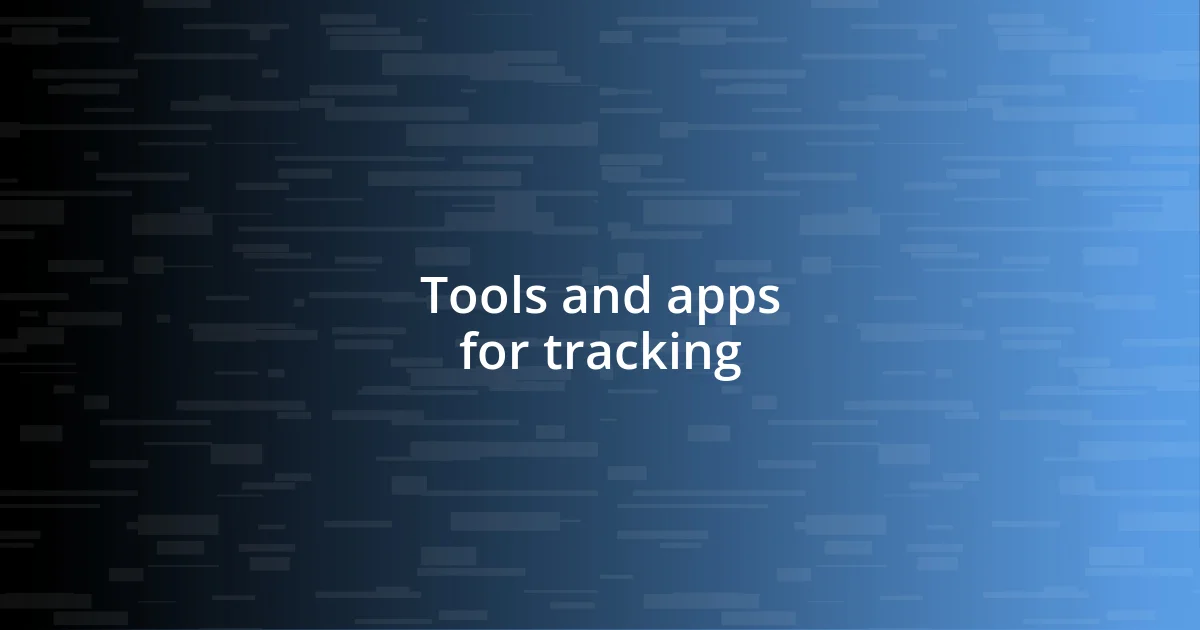
Tools and apps for tracking
Tracking your fuel efficiency has never been easier, thanks to a variety of tools and apps. I remember downloading a fuel tracking app, and it felt like unlocking a new level in my quest for efficient driving. Each time I filled up, I would log my mileage and fuel costs, and before long, I started to see patterns in my driving habits.
Some apps, like Fuelly or GasBuddy, not only help keep track of your fuel consumption but also allow users to compare prices at local gas stations. The first time I found a significantly cheaper option nearby, I couldn’t help but smile—saving money while being mindful of my driving felt like hitting two birds with one stone. Have you tried using any such apps to maximize your savings?
Moreover, many vehicles come equipped with built-in eco-driving features that can assist in your journey. I remember feeling a sense of accomplishment when my car’s onboard computer began offering feedback on my driving style. It was fascinating to adjust my habits in real time and see how small changes resulted in immediate improvements in fuel efficiency. Have you played around with your car’s settings to find out how they might help you on your own journey? Embracing these tools has truly transformed my driving experience.
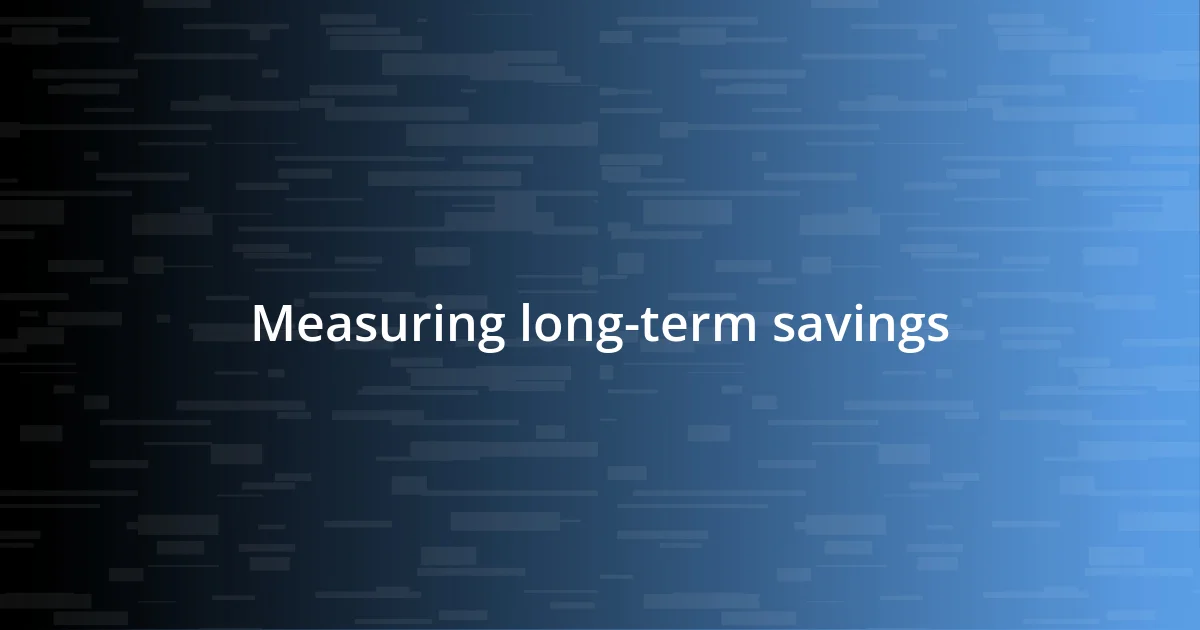
Measuring long-term savings
When I first started measuring my long-term savings from fuel-efficient driving, the results were astonishing. I distinctly remember calculating the savings over six months and realizing I had cut my fuel expenses by nearly 15%. It felt incredible to see how mindful driving truly paid off in dollars and cents. Has your awareness of fuel costs ever nudged you to adjust your driving habits in a similar way?
Another eye-opening moment came when I compared my fuel costs with a friend who drives a less efficient vehicle. I found out that my adjusted driving practices were saving me not just at the pump but also in maintenance costs due to reduced wear on my engine. It was a compelling reminder that fuel savings accumulate over time, influencing overall vehicle health. Imagine if you could track your savings and add them up over years—what could that mean for your budget?
Tracking my savings brought a sense of accountability into my driving journey. I started jotting down my monthly fuel expenditures alongside my mileage and soon realized that even small adjustments led to significant savings. Just last year, I calculated that my fuel-efficiency measures saved me enough money for a weekend getaway! Have you ever considered treating your savings as a reward system to encourage more mindful driving? Each mile could indeed translate into more than just fuel; it can pave the way to experiences you’d love to have.

